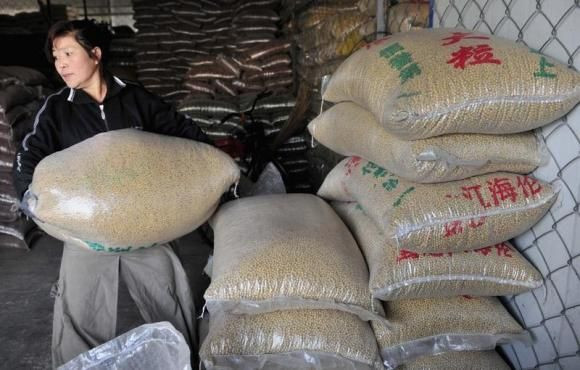China Importers Default On Soy Cargoes

(Reuters) -- Chinese importers have defaulted on at least 500,000 tons of U.S. and Brazilian soybean cargoes worth around $300 million, the most in a decade, as buyers struggle to get credit amid losses in processing beans.
Three companies in the eastern province of Shandong had defaulted on payments for shipments as they were unable to open letters of credit with banks, trade sources said Thursday.
A string of defaults on loans, bonds and shadow banking products in recent weeks has highlighted rising credit risks in China, partly fueled by signs of the economy slowing.
Commodity firms, along with semiconductor and software companies, are among the most at risk of credit defaults, a Reuters analysis of more than 2,600 Chinese companies showed.
Up against the cooling economy and signs that authorities will not step in every time a loan goes bad, Chinese banks are becoming more hard-nosed and selective about whom they lend to.
"There are five to six (panamax) cargoes which are unable to be unloaded at ports because buyers cannot open LCs (letters of credit) and there are no LCs for an additional 5-6 cargoes floating on the sea," one Beijing-based source said. Each panamax cargo is for 50,000 to 60,000 tonnes.
Defaults by buyers in China, which imports 60 percent of the soybeans traded in the world, would likely cap a rally in global prices as they coincide with bumper supplies from Brazil and Argentina hitting the market.
Chicago Board of Trade front-month soybeans edged lower on Thursday after climbing to their highest since July in the last session, when the U.S. Department of Agriculture cut its forecast for stocks remaining at the end of the crop year.
"The reality is that the world is reliant on Chinese imports of soybeans to maintain this price strength," said Luke Mathews, commodities strategist at Commonwealth Bank of Australia in Sydney. "It is putting a question mark on the sustainability of these prices."
The default on 500,000 tonnes of soybeans is the biggest since 2004, when buyers walked away from an estimated 30 contracts, resulting in a loss of close to $700 million, traders said.
Industry sources said some of the companies defaulting have been using soybean imports to secure cheap financing, with interest rates on letters of credit as low as 2 percent and allowing delayed payment of several months.
Having imported large amounts, some of them even sell the oilseed at a loss, as a way to liquidate their stocks and plough cash into more profitable businesses.
Fearing a wave of defaults as China's economy cools after decades of rapid growth, regulators in the past two years told banks to cut off financing to sectors plagued by excess capacity such as steel and cement.
Exporters, in a bid to gain a foothold in the lucrative Chinese market, sometimes ship cargoes when importers do not have confirmed letters of credit, trusting buyers will honor their commitment. The practice was briefly abandoned after the wave of defaults in 2004 but slowly resumed.
© Copyright IBTimes 2024. All rights reserved.





















